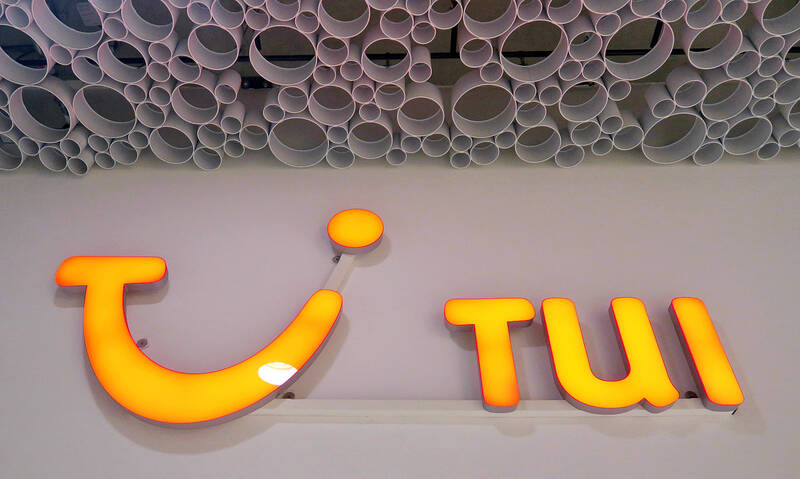TUI AG said summer bookings are approaching pre-COVID-19 pandemic levels, the latest sign that the travel sector is recovering, despite high inflation squeezing household budgets.
The world’s biggest tour operator said booking volumes were at 96 percent of 2019 levels, led by demand for travel to Spain, Greece and Turkey.
Prices are 26 percent higher than pre-pandemic levels, the company said.

Photo: Reuters
“Strong booking development and significantly improved quarterly figures underline our expectations: It will be a strong summer and a good financial year 2023, with a significantly higher operating result,” TUI chief executive officer Sebastian Ebel said in an earnings statement.
TUI, based in Hannover, Germany, received 4.2 billion euros (US$4.6 billion) in state bailouts in 2020 after the COVID-19 crisis punctured a decades-long boom in travel.
The company last month made its final repayment of its assistance package after a capital increase of 1.8 billion euros.
Europeans’ thirst for travel is driving TUI’s recovery. While household energy and food bills have surged in the wake of Russia’s invasion of Ukraine, consumers are still willing to spend on vacations, despite the higher cost of accommodation and flights.
In the fiscal second quarter ending March 31, TUI’s loss narrowed to 242.2 million euros from 329.9 million euros a year earlier.
Analysts had estimated a loss of 228 million euros.
TUI confirmed its full-year guidance for a significant increase in underlying earnings.
Revenue rose to 3.2 billion euros from 2.1 billion euros.
The company said it had secured 8.3 million bookings to date for the summer, and that 55 percent of the program for the season had been sold, which TUI called “broadly in line” with the same season in 2019.
“Outlook commentary is encouraging, with summer ’23 booking close to pre-pandemic levels and pricing strong,” Jefferies International analyst James Wheatcroft wrote in a note.
Like low-cost airlines, TUI is seeking to increase its market share as higher household bills weigh on consumer spending, pushing people toward package holidays that include flights, accommodation, bus transfers and food, and helping them to control the cost of their trip.

Hon Hai Precision Industry Co (鴻海精密) yesterday said that its research institute has launched its first advanced artificial intelligence (AI) large language model (LLM) using traditional Chinese, with technology assistance from Nvidia Corp. Hon Hai, also known as Foxconn Technology Group (富士康科技集團), said the LLM, FoxBrain, is expected to improve its data analysis capabilities for smart manufacturing, and electric vehicle and smart city development. An LLM is a type of AI trained on vast amounts of text data and uses deep learning techniques, particularly neural networks, to process and generate language. They are essential for building and improving AI-powered servers. Nvidia provided assistance

GREAT SUCCESS: Republican Senator Todd Young expressed surprise at Trump’s comments and said he expects the administration to keep the program running US lawmakers who helped secure billions of dollars in subsidies for domestic semiconductor manufacturing rejected US President Donald Trump’s call to revoke the 2022 CHIPS and Science Act, signaling that any repeal effort in the US Congress would fall short. US Senate Minority Leader Chuck Schumer, who negotiated the law, on Wednesday said that Trump’s demand would fail, while a top Republican proponent, US Senator Todd Young, expressed surprise at the president’s comments and said he expects the administration to keep the program running. The CHIPS Act is “essential for America leading the world in tech, leading the world in AI [artificial

DOMESTIC SUPPLY: The probe comes as Donald Trump has called for the repeal of the US$52.7 billion CHIPS and Science Act, which the US Congress passed in 2022 The Office of the US Trade Representative is to hold a hearing tomorrow into older Chinese-made “legacy” semiconductors that could heap more US tariffs on chips from China that power everyday goods from cars to washing machines to telecoms equipment. The probe, which began during former US president Joe Biden’s tenure in December last year, aims to protect US and other semiconductor producers from China’s massive state-driven buildup of domestic chip supply. A 50 percent US tariff on Chinese semiconductors began on Jan. 1. Legacy chips use older manufacturing processes introduced more than a decade ago and are often far simpler than

Gasoline and diesel prices this week are to decrease NT$0.5 and NT$1 per liter respectively as international crude prices continued to fall last week, CPC Corp, Taiwan (CPC, 台灣中油) and Formosa Petrochemical Corp (台塑石化) said yesterday. Effective today, gasoline prices at CPC and Formosa stations are to decrease to NT$29.2, NT$30.7 and NT$32.7 per liter for 92, 95 and 98-octane unleaded gasoline respectively, while premium diesel is to cost NT$27.9 per liter at CPC stations and NT$27.7 at Formosa pumps, the companies said in separate statements. Global crude oil prices dropped last week after the eight OPEC+ members said they would